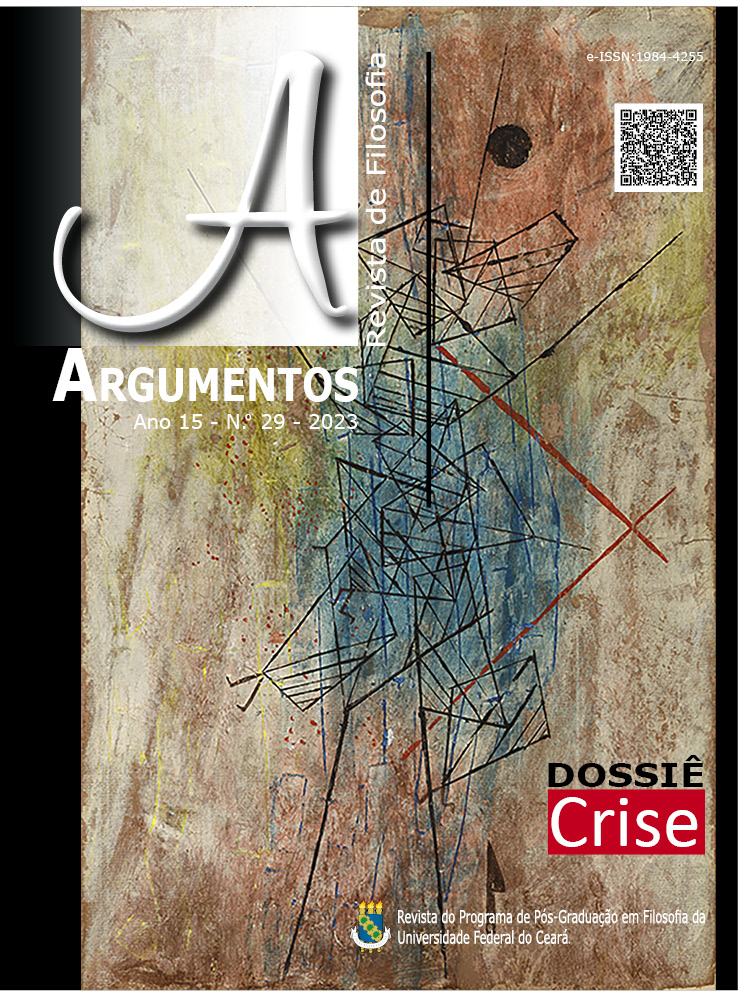Franz Brentano and the philosophical crises in the four phases of its history
DOI:
https://doi.org/10.36517/Argumentos.29.7Keywords:
Franz Brentano. History of philosophy. Crisis.Abstract
This paper analyzes the controversial "theory of the four phases of philosophy," as published by Franz Brentano in 1895, in order to present the role of philosophical crises within the Western historical-philosophical movement. We first describe how Brentano takes the classical division of history into three periods (ancient, medieval, and modern) in order to subdivide each of these periods into four distinct philosophical movements (pure interest philosophical movement, practical interest philosophical movement, skeptical philosophical movement, and mystical philosophical movement). Our analysis will make explicit that, according to the main thesis defended there by Brentano, (a) philosophical movements succeed each other within each historical period as a function of a crisis intrinsic to the historical process of philosophy itself and (b) what defines the philosophical crisis is the way in which each of the philosophical movements, constituent of the second, third, and fourth phases, differ from the philosophical movement constituent of the first phase. As a conclusion to our analysis, we will argue that the Brentanian philosophical historical presuppositions of his "4th habilitation thesis" are the fundamental criteria of ascending philosophy found in the methods of Aristotle, Thomas Aquinas, Bacon, and Descartes. In other words, we maintain that it was a matter, for Brentano, of recognizing in such philosophical methods their power to sustain that kind of perception capable of guaranteeing evidence to knowledge, for this would be the way to prevent philosophy from (i) replacing its theoretical interest with practical interest, (ii) giving itself over to skepticism, or even, (iii) succumbing to mysticism.
References
BRENTANO, F. As teses de habilitação. Tradução de Evandro O. Brito, Ernesto M. Giusti, Camila B. Moreira. Revista Guairacá de Filosofia, Guarapuava, v. 33, n. 2, p. 160-168, 2017.
BRENTANO, F. Auguste Comte und die positive Philosophie. Erster Artikel. In: CHILIANEUM: Blätter für katholische Wissenschaft, Kunst und Leben. Neue Folge, II, 1869.
BRENTANO, F. Comte e a filosofia positiva. Tradução de Flavio Cuvello. Primeiro Artigo. Rev. Filos., Aurora, Curitiba, (No Prelo), 2022.
BRENTANO, F. Die vier Phasen der Philosophie und ihr augenblicklicher Stand. In: A. Chrudzimski & T. Binder (Ed.). Abteilung IV/Band 9 Vermischte Schriften. Berlin; Boston: De Gruyter, 2019. p. 199-226.
BRENTANO, F. Psicología desde el punto de vista empírico. Tradução de Sergio Sánchez-Migallón. Salamanca: Ediciones Sígme, 2020.
BRENTANO, F. The Four Phases of Philosophy and its Current State. In: The Four Phases of Philosophy. Trad. Barry Smith and Balázs M. Mezei. Amsterdam/Atlanta: Rodopi. 1998.
BRENTANO, F. Versuch über die Erkenntnis. Felix Meiner Verlag GmbH, Hamburg, 1970.
BRITO, E. O. Franz Brentano e a psicologia empírica: um projeto de filosofia científica com Comte, contra Comte. Revista Guairacá de Filosofia, Guarapuava, v. 31, n. 1, p. 40-54, 2015.
MEZEI, B. M.; SMITH, B. The Four Phases of Philosophy. Amsterdam/Atlanta: Rodopi, 1998. p. 81-112.
PORTA, M. A. Brentano y el método psicológico. Síntese Revista de filosofia, v. 45, 2018.
TWARDOWSKI, K. Franz Brentano and the History of Philosophy. In: On Actions, Products and Other Topics in Philosophy. Amsterdam: Rodopi, 1999. p. 243-253.
Downloads
Published
Issue
Section
License
Argumentos magazine is licensed under an International Creative Commons Attribution License.
The Magazine uses CC BY inclusion
1) The authors retain the copyright granted to the magazine or the right to initial publication, with the work regularly licensed under the Creative Commons Attribution, which allows the sharing of the work with acknowledgment of authorship and initial publication in this magazine.
2) The authors are authorized to contract additional applicable contracts, for non-exclusive distribution of the version of the work published in this journal (for example, publication in the institutional repository or as a chapter of the book), recognition of authorship and initial publication in this journal.
3) Authors are authorized and encourage to publish and distribute their work online (for example, in institutional repositories or on their personal pages) at any time before or during the editorial process, as they can generate productive changes, as well as increase the impact and reference of published work.




.jpg)










._._3.png)
1.jpg)
._._._.png)
